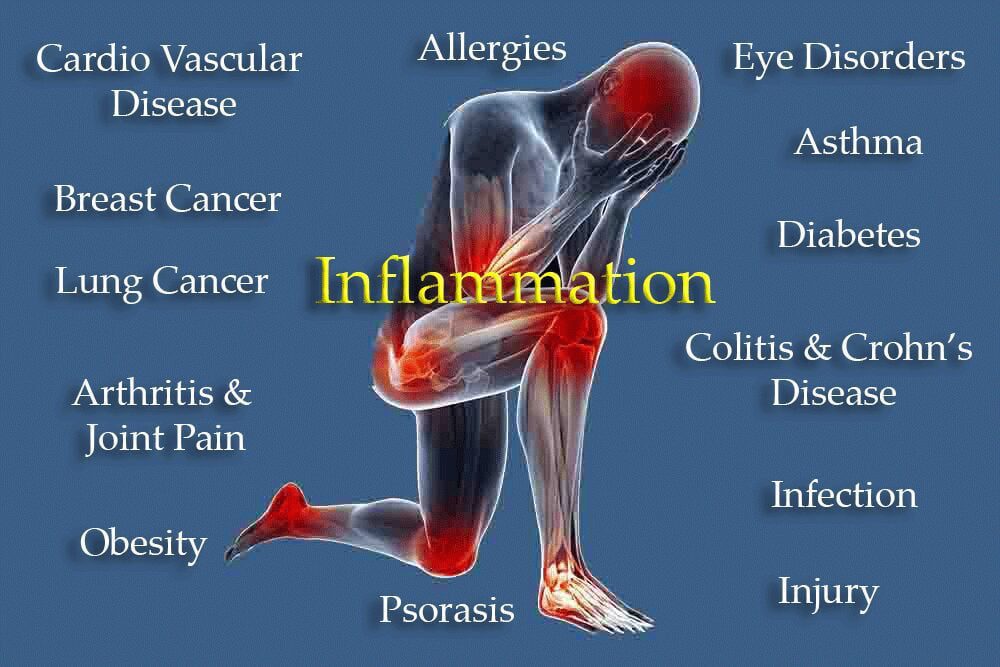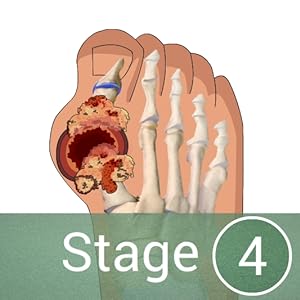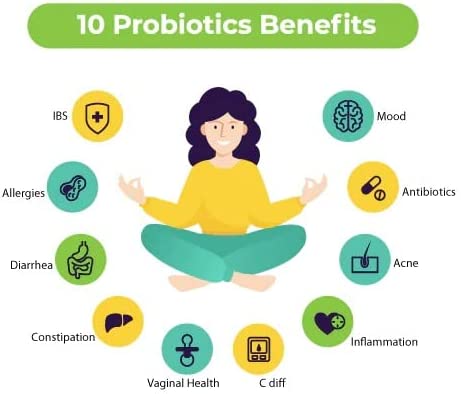Arthritis, Gout, Joint Pain and other Inflammatory Conditions

Eating too much causes inflammation
We know that overeating promotes the inflammatory response and suppresses the immune system. Tests performed by the National Institute on Aging revealed that when animals were fed 50 percent fewer calories per day:
- Their immune response improved.
- The number of inflammatory cytokines in circulation was reduced.
- Thymus size was maintained and inflammation-fighting T-cell function improved.
This study looked at higher and lower calorie consumption; it did not distinguish among the types of calories consumed. Heavy, red-meat-based diets or lots of sugar-laden foods would definitely have a negative impact on immune function and promote inflammation, while calories in the form of fruits, vegetables, legumes, nuts and seeds would improve immunity.
Regardless of the food choices, moderation is the key in terms of both total daily quantity and amounts consumed at one time. Ultimately, five or six small meals (of the right foods) throughout the day are considered to be healthier than consuming fewer large ones. [4]
Fat cells increase inflammation
By and large, even an extra 20 pounds can create an abundance of inflammation in the human body and lower overall immunity. Weight management is an important aspect of maintaining a balanced immune system and controlling inflammation. With over 50 percent of North Americans overweight, and an additional 15 percent or more classed as obese, public health care planners expect to see a tremendous increase in inflammatory diseases. Fat cells act like immune cells and secrete inflammatory factors (histamines and cytokines), especially during weight gain. The more fat cells you have, the more potential there is for inflammation.
Furthermore, weight gain puts tremendous pressure on joints. For every ten pounds of weight gained, 40 pounds or more of additional pressure is put on hips and knees, compressing cartilage and collagen, grinding down bones, promoting damage and inflammatory response. [4]
Don’t fear the fats and up the Omega 3s
Historically, dieting gurus recommended cutting out fat from the diet. The upshot? People got bigger and also got sicker. The reasoning? Turns out saturated fats and fatty acids – and particularly Omega-3 essential fatty acids – contain powerful anti-inflammatory properties. [1] Include low mercury fish selections (about 7-10oz/week) and/or raw nuts and seeds, such as walnuts, ground flaxseed, grapeseed and pumpkin and sesame seeds. Further, be sure to include healthy saturated fats from real butter, coconut oil, tropical palm oil, olive oil (not cooked), ghee, avocados, eggs, and meat in moderation.
Avoid processed fats/trans-fats and hydrogenated/vegetable oils. Fish oils tend to vary greatly in quality assurance. When considering a supplement in addition to the diet, we recommend Pure Antarctic Neptune Krill Oil.
Spice up your life!
Think herbs and spices are only good for adding a little flavor to your food? Turns out many of them also contain high levels of antioxidants and other beneficial compounds that can reduce inflammation and dull pain. One spice frequently touted for its anti-inflammatory properties is capsaicin, which is a naturally occurring ingredient in chili peppers, as well as rosemary, which has rosmarinic acid and ginger which has vanillin and zingerone.
Other good sources include basil, bay leaves, cumin, coriander, dill, fennel, garlic, hyssop, oregano, pepper, sage, and thyme as well as goji, graviola, green tea extract, spirulina and white willow bark, which contain salicylic acid, one of the active ingredients in aspirin. [1] When it comes to Turmeric, there’s practically nothing that compares to its benefits.
Get some sleep!!
Having a few restless nights can exacerbate any underlying symptoms of inflammation. To ensure adequate sleep, experts recommend snoozing for between six and 12 hours nightly, with sleep requirements varying based on age, activity level, overall health and other factors. [1] Are you plagued with insomnia? Be sure to talk to your physician about non-drug options, as well as trying to figure out the cause.
Often times, insomnia can be treated with some lifestyle changes, cognitive behavior therapy, and exercise. Pills are not the only way to beat insomnia and should be avoided at all costs. With this in mind, be sure to get to the underlying cause to avoid just treating the symptom!
Manage healthy glucose levels. Avoid substitute sugars
One should aim to stay under 25 g of total fructose per day. This can add up quickly with processed foods! Bread, pastry, pasta = sugar. In addition to helping pack on the pounds, simple carbohydrates rev up inflammation by causing surges in blood sugar that promote a chemical reaction in cells called glycosylation, or the browning effect. To avoid such surges, stick to complex carbohydrates with a low glycemic index such as apples, asparagus, beans, broccoli, blackberries, blueberries, cabbage, cantaloupe, citrus fruits, green beans, leafy greens, pears, raspberries, spinach and strawberries. [1]
READ your food labels and steer clear of processed/boxed foods as much as possible. More often than not, high- fructose corn syrup is the top ingredient. AVOID!! Avoid substitute sugars such as aspartame, sucrolose/splenda, saccharin, Acesulfame-K. Each is full of undesirable side effects and cancer-causing agents. Should you feel the need to sweeten any of your fresh foods, consider a natural sweetener such as Stevia.
Stress management is essential
Stress is a lurid offender to the body. Stress raises the body’s acidity and kills off strains of good bacteria required to protect you. It causes the body to release inflammatory markers into the bloodstream. Stress can be a key factor in disease growth as it flourishes in these types of environments. Further, do not overlook the importance for researching natural and successful ways of dealing with stress! EFT Tapping, deep breathing, massage, acupuncture, exercise, and more are proven ways to reduce the danger of anxiety and stress in your life. [5]
Food allergies?
Another food source you need to steer clear of? For some people, this might mean wheat, eggs, gluten, dairy, soy, or some forms of nuts. To determine whether you have sensitivity to a particular food, try eliminating it for at least two weeks and see if symptoms such as lethargy, headaches or bloating subside. REDUCE GRAIN INTAKE! Any reduction in grain products has benefits beyond the anti- inflammatory properties. [1]
Vitamin Needs
While adding a multivitamin can help stave off inflammation, the key here is to find a high-quality supplement with the types of nutrients you need. [1] Certain vitamins may help control inflammatory processes in the body and would include Folic Acid, B6, and Vitamins A, E, and C.
However, we do not recommend you take Vitamin C in high pill form dosages, particularly if you suffer with joint pain. Vitamin C, in pill form, has been known to fire up the joints by over storing iron in the body. Increased C intake should come mainly from indulging in the foods which contain higher levels (chili peppers, bell peppers, parsley, thyme, guava, dark leafy greens, kiwi, oranges, clementine, broccoli, cauliflower, brussel sprouts, papayas, strawberries).[2]
Moreover, Niacin (in certain forms) can also have the same negative effect, firing up the joints. Niacin, in the form of niacinamide, appears to have significant anti-inflammatory properties. This form of vitamin B3 has been shown to reduce inflammation in the joints of people who suffer from osteoarthritis.[3]
Probiotic power
They say the way to a man’s heart is through his stomach, but it turns out that’s also the same route to reduced inflammation! Beneficial bacteria in the gut are a naturally occurring phenomenon. However, antibiotic use, stress, and poor diet can all upset this delicate balance, resulting in an infiltration of undesirable bacteria that can lead to inflammation. [1]
Studies show Probiotics to stimulate the immune system, help to digest dairy products by manufacturing the enzyme lactase, have powerful anti-carcinogenic qualities helpful against certain cancers and tumor growths, help to lower the bad cholesterol, aids to synthesize the B vitamins, promote regularity and overall digestive tract functions, help to recycle estrogen for women, counteract the negative effects of antibiotic use, and create their own natural antibiotics used by the body to fight illness, infection, yeast, and any other disease causing pathogens that threaten their territory. [6]
Daily Water Needs
Divide your weight in half. This is how many ounces of water you need each day, consumed at a slow but steady pace from rise to fall. If you weigh 180lbs, divide by 2 = 90oz of water daily. Drinking water should come from a pure source, preferably filtered for purity and filters replaced according to manufacturer suggestions. Optimal drinking water pH is 7.0

- https://www.marksdailyapple.com/naturally-reduce-inflammation/#ixzz1vcXG45ju
- https://www.healthaliciousness.com/articles/vitamin-C.php
- https://vitamins.ultimatefatburner.com/niacin-review.html
- https://www2.healthyimmunity.com/books/get-a-grip-on-arthritis/Causes-of-Chronic-Inflammation.asp
- https://www.helpguide.org/mental/stress_management_relief_coping.htm
- https://goutcure.com/prth.html
- https://www.paleoplan.com/recipes/
- https://reverseyourhealth.com/
- https://wholeliving.com/
- https://rachaelraymag.com/
- www.livestrong.com/article/469322-high-fructose-corn-syrup-uric-acid/





Leave a Reply